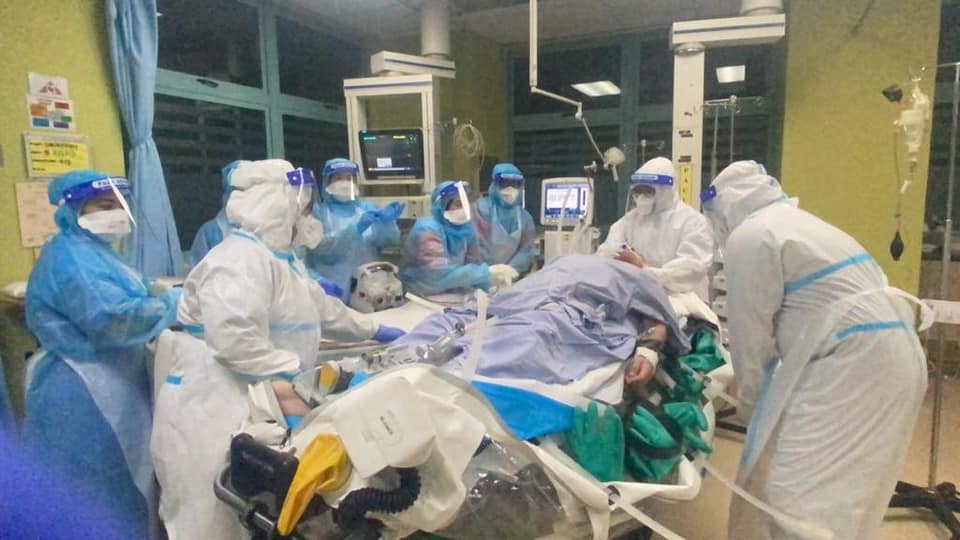KUALA LUMPUR, July 8 – A new Covid wave caused by the highly infectious BA.4 and BA.5 variants is much less likely to be more severe than the first Omicron wave, Khairy Jamaluddin says.
The health minister said while the two new Omicron subvariants are the most contagious yet, with previous Covid infection and vaccines unlikely to provide much protection against the new strains, both viruses do not appear to cause more severe disease.
“At the moment, we’re not seeing any changes in the severity of the cases. I was informed by infectious disease experts that it is very likely that the severity of BA.5 cases will not be worse than the initial Omicron wave.
“So, we’re expecting the severity to be roughly the same as the initial Omicron wave,” Khairy told reporters at a press conference in Parliament today.
As of June 30, health officials have confirmed 13 Omicron sublineage cases in Malaysia consisting of six BA.2.12.1 cases, five BA.5 cases, and two BA.5.2 cases. The 13 cases were detected between May and June 2022, with no BA.4 case reported as yet.
“This means that BA.5 is already in Malaysia. It is very likely that the variant has spread throughout the country,” Khairy said. “If we look at the epidemiological trend in other countries, BA.5 is the dominant variant that is driving cases up globally. We expect the same variant to cause similar increases in cases in Malaysia.”
Various versions of the highly transmissible Omicron variant have fuelled cases globally in recent weeks. Between epidemiological week 24 (EW24) and EW25, the BA.4 sublineage increased from 11 per cent to 12 per cent, while the BA.5 sublineage rose from 37 per cent to 52 per cent.
The BA.2 sublineage has also contributed to 24 per cent of cases, with BA.2.12.1 accounting for the other 11 per cent over the past week.
Khairy warned that the rapidly spreading BA.5 variant could result in an increase in hospital admissions as seen in countries like Singapore, Portugal, and the United Kingdom.
“The Omicron BA.5 is the most contagious version of the Covid-19 virus to date. It is more transmissible than the previous BA.1 and BA.2 Omicron variants.
“Those who have completed their Covid-19 vaccination or have been previously infected with Covid-19 are more likely to be reinfected with this variant. This will also contribute to an increase in Covid infections in the next few weeks,” Khairy said.
According to cumulative data from the Ministry of Health (MOH), Covid reinfections during the Omicron wave are 6.3 times higher compared to reinfected cases reported during the Delta wave. The Omicron wave has seen a total of 14,630 Covid reinfections versus 2,295 reinfected cases during the Delta wave, as of July 6.
Despite being more transmissible, Khairy said data on the new strains from Israel and the United States showed that individuals who have completed their primary vaccination and received two booster doses have a lower mortality rate compared to those who have taken only a single booster dose, especially in people aged 60 and above.
“Those who have taken one booster dose also have a lower Covid mortality rate compared to individuals who have not been boosted or those who have yet to be vaccinated against Covid-19,” Khairy said.
The drop in Covid testing in Malaysia has also created a “blind spot” in projecting the BA.5 wave, Khairy said.
“The challenge that we face now is that when there’s a drop in PCR testing for Covid, the amount of whole genome sequencing that we can do will also see a decline. We can only do whole genome sequencing on cases that were PCR-tested, not RTK-tested cases.
“As a result, we have a bit of a blind spot now, and this is not happening just in Malaysia. Many countries have reported similar drops in RT-PCR tests, and so have their genomic surveillance.
“When genomic surveillance is low, it’s difficult to know the prevalence of BA.5 and the information will be delayed. I expect if we see an increase in BA.5 cases in the next few weeks, it may rise up to a maximum of three months.
“In Singapore, they may have already reached a peak after seeing an increase in the past two months, so I expect it will be the same for Malaysia where we may see cases rise for about a month or two, three months at the most, where it will peak and decline again.
“This is also based on our experience with the initial Omicron wave,” Khairy said.








